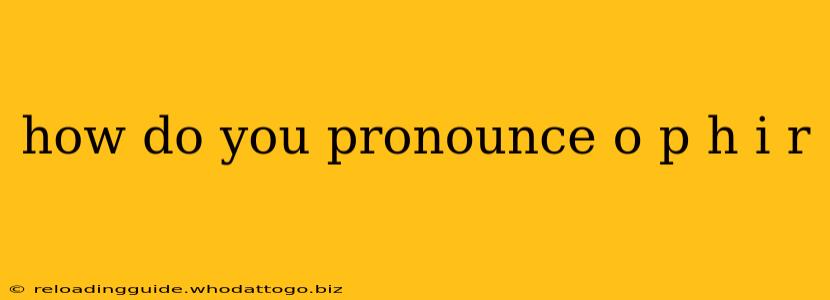The pronunciation of Ophir depends heavily on context and individual interpretation, as the word's origins are ancient and its usage has evolved across languages and time. There's no single, universally accepted pronunciation.
Understanding the Word's Origins
Ophir (אֹפִיר) is a name appearing in the Hebrew Bible, referring to a land famed for its gold, precious stones, and exotic goods. Its precise geographical location remains a subject of scholarly debate, with various theories ranging from locations in India to East Africa. This uncertainty contributes to the variability in pronunciation.
Common Pronunciation Variations
Because of the lack of a definitive location and the passage of time, several pronunciations have emerged:
1. Classical Hebrew Pronunciation:
This is the most etymologically accurate approach, based on the Hebrew vowels and consonants. It sounds something like OH-feer with a long "O" sound as in "go" and a short "ee" sound as in "see." The stress usually falls on the first syllable.
2. Modern English Approximations:
Due to the word's adoption into English, variations have arisen based on how English speakers interpret the spelling. Some common approximations include:
- OH-fir: Similar to the classical pronunciation but with a slightly shorter "ee" sound.
- OF-ir: This shifts the stress to the first syllable and shortens the "O" sound.
- O-feer: Similar to the classical pronunciation, explicitly showing the two syllables.
Factors Influencing Pronunciation
Several factors can affect how someone pronounces Ophir:
- Background/Education: Individuals with a background in Hebrew studies are more likely to use a pronunciation closer to the Classical Hebrew version.
- Regional Dialects: English speakers from different regions may naturally pronounce the word differently, even when using the same spelling.
- Context: The context in which the word is used (e.g., a biblical studies lecture versus a casual conversation) might influence the chosen pronunciation.
Best Practice for Pronunciation
While there's no definitively "correct" pronunciation, it's generally recommended to:
- Prioritize clarity: Choose a pronunciation that is easy for others to understand.
- Consider context: Adjust your pronunciation based on the audience and the situation.
- State your pronunciation: If unsure, it's always acceptable to explicitly state your pronunciation ("I pronounce it OH-feer") to avoid any misunderstandings.
In conclusion, the pronunciation of Ophir is flexible, and choosing one over another doesn't necessarily indicate error. Clarity and context are paramount. The most important aspect is to choose a pronunciation that ensures effective communication.

